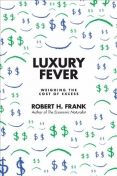BKMT READING GUIDES
Luxury Fever: Weighing the Cost of Excess
by Robert H. Frank
Paperback : 336 pages
0 club reading this now
0 members have read this book
The turn of the twenty-first century witnessed a spectacular rise in gross consumption. With the super-rich setting the pace, everyone spent furiously in a desperate attempt to keep up. As cars and houses grew larger and more expensive, the costs were enormous--not only monetarily but ...
Introduction
The turn of the twenty-first century witnessed a spectacular rise in gross consumption. With the super-rich setting the pace, everyone spent furiously in a desperate attempt to keep up. As cars and houses grew larger and more expensive, the costs were enormous--not only monetarily but also socially. Consumers spent more time at work and less time with their family and friends; they saved less money and borrowed more.
In this book, Robert Frank presents the first comprehensive and accessible account of these financial choices. Frank uses scientific evidence to demonstrate how these spending patterns have not made us happier or healthier. Luxury Fever offers an exit from the rat race, suggesting ways to curb the culture of excess and restore true value to our lives.
Luxury Fever: Why Money Fails to Satisfy in an Era of Excess is a serious examination of the long-term costs associated with our society's ever-accelerating spiral of conspicuous consumption, followed by a far-reaching remedy that will intrigue anyone concerned with related fiscal issues. Robert Frank, a Cornell University professor of economics, ethics, and public policy, who previously coauthored The Winner-Take-All Society, believes neither foolishness nor greed is really responsible for our relentless desire to own flashier household appliances, bigger sport-utility vehicles, and fancier suburban houses; rather, he contends, it is the ongoing behavior of our peers which ultimately determines how much we spend and how we spend it. Frank goes on to claim, however, that this knowledge alone may actually point us toward an alternative that is both acceptable and practical. "By a simple and easily achieved rearrangement of our current consumption incentives," he writes, "we can effectively enrich ourselves by literally trillions of dollars a year." He then goes on to discuss the recent boom in luxury spending, its potential implications for those at all income levels, his suggestions for altering current consumption patterns, and the reasons that redirecting these funds could benefit everyone. --Howard Rothman
Discussion Questions
No discussion questions at this time.Book Club Recommendations
Recommended to book clubs by 0 of 0 members.
Book Club HQ to over 90,000+ book clubs and ready to welcome yours.
Get free weekly updates on top club picks, book giveaways, author events and more








